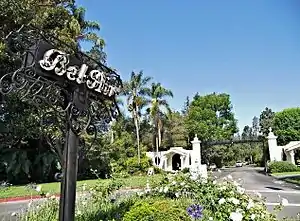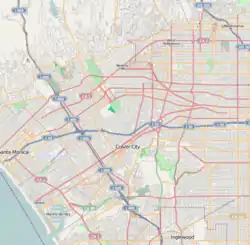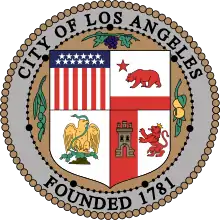East Gate Bel Air, Los Angeles
East Gate Bel Air (or Old Bel Air) is a small area within the Bel Air section of Los Angeles, California. It is made up of large, old estates developed mostly before World War II.
East Gate Bel Air | |
|---|---|
 The East Gate entrance to Bel Air at Beverly Glen and Sunset Blvds. | |
 East Gate Bel Air Location within Western Los Angeles | |
| Coordinates: 34.080833°N 118.435556°W | |
| Country | United States |
| State | California |
| County | Los Angeles |
| City | Los Angeles |
Location
As shown in the “Bel Air First Residential Allotment” map from 1923, the original Bel Air tract of East Gate Old Bel Air founded and opened by Alphonzo E. Bell, Sr. was composed of 128 lots on Bel Air Road (which passes north from South Beverly Glen and Sunset Boulevards through the East Gate entrance[1]—and hence the logical East Gate name) and the five roads which branch from it: Saint Pierre, Saint Cloud, Bellagio (to Stone Canyon), Copa De Oro, and Nîmes Roads.[2] Though many of these 128 lots have since been combined into single properties, this original 1923 Bel Air allotment is what distinguishes East Gate Old Bel Air from the rest of present-day Bel Air, which was gradually added by Bell starting in 1931 with Stone Canyon (known then as Bel Air Woodland), and by 1937 Bel Air extended westward all the way to Sepulveda Boulevard (its westernmost boundary today).[3]
At its southernmost edge (where Copa de Oro Road meets Sunset Boulevard), East Gate Old Bel Air flanks the campus of UCLA. At its easternmost edge, it borders Holmby Hills. This combined contiguous area of East Gate Bel Air and Holmby Hills straddles North Beverly Glen Boulevard (at a bend of Saint Pierre Road and De Neve Square Park).
In general, the further one moves west from Saint Pierre Road to West Gate Lower Bel Air and north from Sunset Boulevard up the Santa Monica Mountains to Upper Bel Air, the smaller and the less flat the building lots and the more varied the styles and price ranges of the homes (with development fueled largely by postwar demand in the 1950s).
History
On the undeveloped hillsides of original Bel Air in 1922, Alphonzo Bell built water and sewage pipes, installed underground electric and telephone lines, and planted thousands of trees along winding streets traversing the hilly terrain.[2] Bell refused to sell the original East Gate Old Bel Air allotments to anyone in the film business, though changed his mind on all of Bel Air with the arrival of the Great Depression. A design committee existed (and still exists to the present day[3]) to preserve the “architectural harmony” of the community, with restrictions including low masses, horizontal lines, pitched roofs, and unobtrusive and harmonious colors,[2] and deed restrictions required land purchasers to spend a minimum of $20,000 on home construction.[1]
Notable residents
References
- "A part of the city, yet apart from it too," Los Angeles Times, Mar. 6, 2005
- Houses of Los Angeles, Volume II, Sam Watters, 2007. p.12,13
- "Bel Air Association website". Archived from the original on 2011-06-23. Retrieved 2010-04-25.
- BlockShopper website
- "The Sky’s the Limit", Los Angeles Magazine, Jan., 1998. p.52
- Big Time Listings website, Nov. 1, 2008
- "Big Time Listings website, Feb. 29, 2008". Archived from the original on 2010-04-07. Retrieved 2010-04-25.
- "Be The Reagans' Neighbor," Forbes, Dec., 2000
- King of the Night: The Life of Johnny Carson, Laurence Leamer, 2005. p.240
- Paul Revere Williams Project website
- Alfred Hitchcock: A Life in Darkness and Light, Patrick McGilligan, 2004. p.245
- The Huffington Post FundRace 2008 Contributions map Archived 2011-11-17 at the Wayback Machine
- "Legendary Estates". Archived from the original on 2009-12-19. Retrieved 2010-04-25.
- "King of the wild frontier," The Observer, Mar. 15, 2009
- Real Estalker website, Oct. 21, 2008
- A Windfall of Musicians: Hitler's Emigres and Exiles in Southern California, Dorothy Lamb Crawford, 2009. p.45
- Real Estalker website, Nov. 21, 2008
- http://www.tyrone-power.com/article_portraits_1.html /Look Magazine December 2, 1952
- In And Out Of Character autobiography by Basil Rathbone
- Linda Finch, Basil Rathbone Memorial Society
- https://www.facebook.com/pages/Basil-Rathbone-Memorial-Society/119835868090128?ref=hl
- The Huffington Post FundRace 2008 Contributions map
- "J-Lo and Marc Anthony Sell In Los Angeles to Financier," The Wall Street Journal, Jan. 8, 2010
- Movie Star Homes , Judy Artunian, Mike Oldham 2004.
- The Huffington Post FundRace 2008 Contributions map

